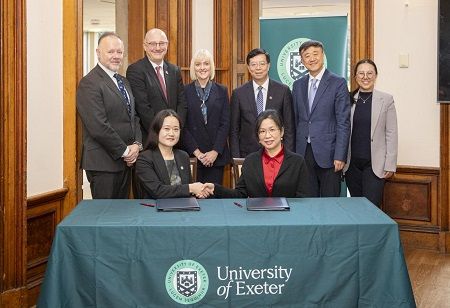-
Tsinghua University delegation led by Secretary of the CPC Tsinghua University Committee Qiu Yong visited the United Kingdom this fall. In the visit, Tsinghua University signed key agreements with the top UK universities in terms of heightened cooperation and new opportunities for education, science, and humanities.
He attended the Annual Conference of the China-UK Humanities Alliance for Higher Education during his visit. He also met with leaders from leading institutions - the University of Cambridge, University College London (UCL), the London School of Economics and Political Science (LSE) and the University of Exeter.
Qiu and the Tsinghua delegation visited the University of Cambridge, where they held a comprehensive meeting with Deborah Prentice, Vice-Chancellor of Cambridge. During the discussion, Qiu outlined Tsinghua’s initiatives in enhancing its college system to cultivate innovative and exceptional talents, as well as its efforts to implement a global strategy aimed at broadening the university’s international vision and influence. He emphasized the long-standing and fruitful relationship between Tsinghua and Cambridge, highlighting the extensive collaboration in areas such as talent development, scientific research, and faculty-student exchanges, which have established a strong foundation for advancing bilateral cooperation in both science and the humanities. Qiu also expressed optimism for the future, proposing that the two universities continue to deepen their partnership by working together to drive educational transformation, promote technological innovation, and integrate social development. In response, Professor Prentice commended the achievements of their collaboration and expressed her desire to strengthen communication between the two institutions, particularly in fostering connections among young people to promote mutual understanding and friendship while addressing global challenges collaboratively.
The delegation also toured the Cavendish Laboratory, gaining insights into Cambridge’s pioneering research at the forefront of science and innovation. They then visited the Lucy Cavendish College, where they met with Dame Madeleine Atkins, President of Lucy Cavendish College. The visit culminated in the signing of a Memorandum of Understanding (MoU) between Tsinghua’s Yinghua Scholars Program and Zhili College with Lucy Cavendish College, marking a significant step in strengthening academic cooperation.
During their visit to the UK, Qiu and the delegation also engaged with the leaders of UCL, LSE, and the University of Exeter to discuss deepening collaboration in areas such as talent development, research innovation, medical education, and sustainable development. A MoU was signed with LSE to advance joint efforts on climate change and sustainable development, reflecting the shared commitment to tackling global challenges. With the University of Exeter, an agreement was formalized to establish the Tsinghua-Exeter Joint Institute for Global Humanities, with Qiu and Lisa Roberts, President and Vice-Chancellor of Exeter, unveiling the new center together. Additionally, the first-phase results of the Digital Archive of the Middle East (DAME) Project, a collaborative project between Tsinghua and the University of Exeter, were delivered, marking a significant milestone in their partnership. These efforts underscore Tsinghua’s dedication to fostering multidisciplinary, cross-border collaboration to address pressing global issues.
Addressing the 8th Annual Conference of the China-UK Humanities Alliance for Higher Education, held at University College London (UCL) on November 15, Qiu Yong, Secretary of the CPC Tsinghua University Committee and Chair of the University Council, highlighted the decisive role of the humanities in forging mutual understanding, trust, and progress worldwide. He always insisted on higher education not just as a blossoming of talent and cultural heritage, but as a means to overcome social patterns and build the future.
This year, the convention focuses on the theme 'Worlds and Worldviews'. Comparative and World Literature, Arts and Humanities Education have been discussed from multiple views and Environmental Humanities, including initiatives toward planetarity and other ontologies. He cited that such debates allow the scholars of different cultural and academic values to exchange their thoughts, discuss problems, and inspire something new. Qiu further stressed that the China-UK Humanities Alliance had acted as a bridge allowing Chinese and UK scholars to work together and understand each other.
Except the conference, Qiu and his delegation visited the Confucius Institute for Business London (CIBL). He highlighted that the institute serves as an intermediary function in this cultural exchange activity. They also met with Chinese alumni in the UK to hear their suggestions on how China-UK relations can be further enhanced. During a visit to the Chinese Embassy in the UK, Qiu met Ambassador Zheng Zeguang, exploring possibilities of further expansion of collaborations established by Tsinghua University in different sectors in the UK. The tour, attended by several prominent figures at Tsinghua, marked the university's interest in serious ties globally.
🍪 Do you like Cookies?
We use cookies to ensure you get the best experience on our website. Read more...

